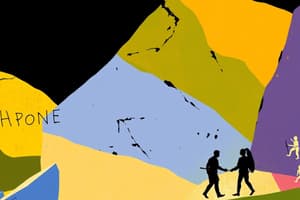Podcast
Questions and Answers
Seleucus I Nicator or his son Antiochus I Soter ordered the founding of Ai-Khanoum in ______.
Seleucus I Nicator or his son Antiochus I Soter ordered the founding of Ai-Khanoum in ______.
the late 4th century BC
The city of Ai-Khanoum was strategically important due to its location at the confluence of ______ rivers.
The city of Ai-Khanoum was strategically important due to its location at the confluence of ______ rivers.
two
The city was protected by steep cliffs on ______ sides and a small moat on the third.
The city was protected by steep cliffs on ______ sides and a small moat on the third.
three
Flashcards are hidden until you start studying
Study Notes
-
Ai-Khanoum was a Hellenistic city in Afghanistan that was founded by an official acting on the orders of Seleucus I Nicator or his son Antiochus I Soter.
-
The city lost some importance through the secession of the Greco-Bactrians under Diodotus I.
-
Seleucid construction programmes were halted, and the city probably became primarily military in function; it may have been a conflict zone during the invasion of Antiochus III.
-
Ai-Khanoum began to grow once more under Euthydemus I and his successor Demetrius I, who began to assert control over the northwest Indian subcontinent.
-
Many of the present ruins date from the time of Eucratides I.
-
Soon after his death c. 145 BC, the Greco-Bactrian kingdom collapsed—Ai-Khanoum was captured by Saka invaders and was generally abandoned, although parts of the city were sporadically occupied until the 2nd century AD.
-
Hellenistic culture in the region would persist longer only in the Indo-Greek kingdoms.
-
Ai-Khanoum was founded by the Achaemenids in the late 4th century BC.
-
It became a major city under the Seleucids, with a mint and a temple.
-
The city's development was slowed when the Greco-Bactrian Kingdom was founded.
-
The Seleucid emperor Antiochus III invaded the Greco-Bactrian Kingdom in 209 BC, but was unsuccessful.
-
Ai-Khanoum was not attacked by the invaders.
-
The Seleucid emperor Antiochus III invaded the Greco-Bactrian Kingdom in 261 BC, but was unsuccessful.
-
Diodotus I, governor of the eastern provinces, seceded from the Seleucids and founded the Greco-Bactrian Kingdom.
-
Under Diodotus, the temple and sanctuary were reconstructed, but most Seleucid construction programmes were not continued.
-
Bertille Lyonnet theorizes that during this time Ai-Khanoum was merely a military stronghold with administrative functions.
-
Ai-Khanoum was the capital of the Greco-Bactrian Kingdom.
-
The city prospered during the rule of Eucratides I.
-
The city was reoccupied by nomadic tribes in the 2nd century AD.
-
The final inhabitants of Ai-Khanoum abandoned the city around 2nd century AD.
-
John Wood was the first European to rediscover the site in 1838.
-
The French Archaeological Delegation led the excavation of the site in 1961.
-
The site was excavated easily because it had never been resettled.
-
The excavation revealed that the city was once prosperous.
-
The city of Ai-Khanoum was founded on a triangular plain in the region of Bactria, at the confluence of the Oxus and Kokcha rivers.
-
The city was strategically important due to its location at the confluence of two major rivers and its strong defensive capabilities.
-
The founders of the city built Ai-Khanoum to a high defensive standard, with strong walls and a natural acropolis.
-
Ai-Khanoum was located 10 kilometers downstream from the confluence of the Oxus and Qizilsu, a tributary whose valley provided access to the mineral-rich Western Pamirs and Chinese Turkestan.
-
The city was protected by steep cliffs on three sides and a small moat on the third.
Studying That Suits You
Use AI to generate personalized quizzes and flashcards to suit your learning preferences.



